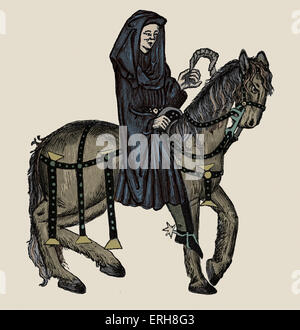

I bring out a brass shoulder blade that contains within it the relics of a sheep that once belonged to an Old Testament prophet.

Everyone recognises them for what they are – or at least, for what they believe them to be! Then I produce some bones and other relics, encased in glass. I speak a few words of Latin, just to impress everybody and to encourage thoughts of devotion. And after this, I will deliver my address, drawing attention to all the papal bulls that I have, the signatures of cardinals, of bishops and even patriarchs of the Church in the east. I will tell everybody where I have come from, and set out all my papal indulgences and show off my seal of authority, so that nobody will have the courage to interfere with me. 'Can you all see it? Put your hand inside this glove and the yield of your wheat and oats will soar, wherever it has been sown so long as you have paid me a penny for this privilege.' Mine is radix malorum est cupiditas, which is to say, money is the root of all evil. And it helps to speak on only one subject.


'When I preach in churches I try my best to cry my words out with clarity and resonance, like a peel of bells, for I know them all by heart and it is good to sound authoritative. 'Lordings,' quod he, 'in chirches whan I preche, I peyne me to han an hauteyn speche, and ringe it out as round as gooth a belle – My most esteemed fellow travellers,' called out the pardoner. This tale from the Pardoner follows the tale from the Physician in all versions of the sequence, and is another of Geoffrey’s Canterbury Tales – a collection of short stories each recounted from the mouth of a pilgrim on the way to Saint Thomas Becket’s shrine in Canterbury Cathedral.Īvailable also to view/download in PDF and DOCX He hasn’t been able to do this yet, however, and much to his chagrin, despite knocking on his mother’s gate, the soil, crying: “let me in!” And hence his extreme age, he explains. In his tale, three drunken rogues stagger out of a tavern to look for the rascal Death – perhaps the Black Death – and are guided in his direction by a white-haired old man who is looking, not with fear and hope towards an eternal bliss in heaven, but to exchange his old age for a young man’s youth. The Pardoner’s tale begins with a rip-roaring lampoon of all the wiles, deceptions and outright lies peddled by a man who gives sermons in churches and sells indulgences obtained from the Papal Court in Rome. Geoffrey Chaucer Huntington Library, San Marino, California MS EL 26 C 9, the Ellesmere Manuscriptīritish Library, Harley MS 7334, and many other manuscripts and printed editions From The Canterbury Tales


 0 kommentar(er)
0 kommentar(er)
